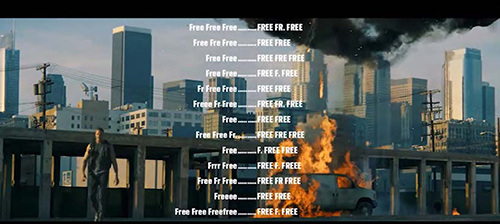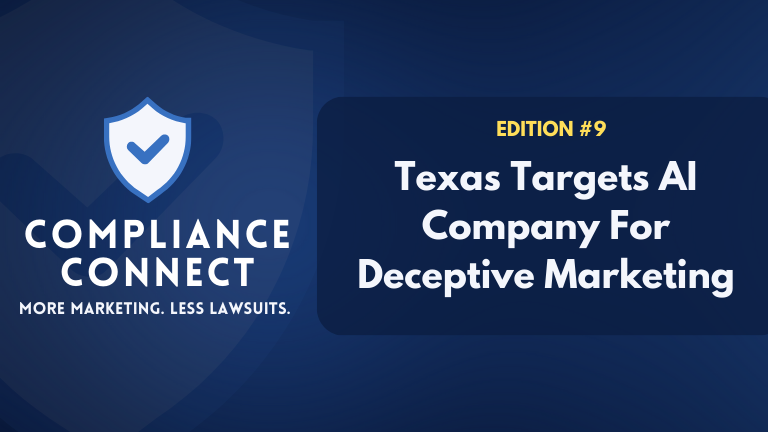Good morning! This is the ninth edition of the Compliant Connect newsletter.
The goal is simple: to keep you in the loop on what the FTC and other regulatory agencies are up to so that you can protect yourself.
These newsletters will land in your inbox twice a week – Mondays and Thursdays.
Remember: this is NOT legal advice, only information!
Here’s the rundown today…
- 🤖 First Of Its Kind State Lawsuit Against AI Company
- 🏛️ New Development In Amazon Case
- 🎯 The Maker Of TurboTax Was Targeted For Saying “Free”
- ⚠️ Revealed: Major Compliance Mistake
- 🚨 States With The Most Reported Fraud
Compliance Digest: What You Should Read Today
Texas Settles Deceptive Marketing Allegations Against Health Care AI Company
We talked about the recent FTC crackdown on AI company’s misleading claims. State AGs are also taking action.
On September 18, Texas announced a settlement with Pierces – a company that sells AI products to hospitals.
According to Texas, Pieces claimed that its healthcare AI products were “highly accurate” in its marketing. They specifically claimed an error rate or “severe hallucination rate” of <1 per 100,000.
The Texas AG office alleges that the company could not back this claim up.
The settlement calls for Pierces to…
- Disclose what their metrics mean and how they were calculated.
- Not make any misrepresentations about what their product does.
- Disclose to new customers any potential harms of their product.
This is the first time a state has gone after an AI company for deceptive marketing… but it probably won’t be the last.
Amazon Wins Partial Victory Against The FTC
A federal judge partially dismissed the FTC’s antitrust lawsuit against Amazon. However, the FTC’s case will proceed.
The ruling is sealed, so we don’t know many details. Neither Amazon or the FTC have commented.
In its complaint last year, the FTC accused Amazon of reducing competition by “stifling competition on price, product selection, quality, and by preventing its current or future rivals from attracting a critical mass of shoppers and sellers” among other allegations.

Case Breakdown: Intuit TurboTax
Here’s an interesting case from earlier in the year.
It involves TurboTax, a tax preparation software that allows customers to prepare and file their income tax returns.
In 2022, the FTC sued Intuit, the maker of TurboTax.
The case revolved around a key part of the Pentagon of Compliance: the net impression you create for your customer.
Note: Here is Intuit’s response.
Creating A False Net Impression
For many years, ads promoting TurboTax touted its free tax filing option, which is limited to specific tax returns (Mainly for people with only W-2 income).
Some of their ads consisted almost entirely of the word “free” spoken repeatedly (Some are still up on YouTube).
The FTC claimed that the reasonable impression customers would get from these ads is that they could get their taxes prepared for free.
According to the commission, this was deceptive since about two-thirds of tax filers in 2020 would have been INELIGIBLE for the company’s free offerings.
For example, freelance workers who received 1099 forms could NOT use the free version of TurboTax.
There were disclaimers in the ads, but the FTC said that they were difficult to see and that reasonable consumers would still believe that TurboTax products would be free for them.
So technically Intuit didn’t lie… but the net impression they created was misleading.
The Final Order
The case was an administrative action.
Intuit was not hit with a monetary judgement. However, they were prohibited from advertising or marketing that any good or service is free UNLESS it’s free for all customers.
If it isn’t actually free for all customers, they would need to disclose clearly & conspicuously and in close proximity to the “free” claim the percentage of taxpayers or consumers who qualify for the free version.
The Big Takeaway: Even if you technically don’t lie, you can still get hit if you create a FALSE net impression.
Here’s an example of an ad Intuit put out after the final order.
Did You Know…
According to the FTC, the states with the highest reported amount of fraud per capita were Georgia, Florida, Nevada, Connecticut and Delaware.

Quick Compliance Tip: False Scarcity
You’ve probably heard something like this in a webinar…
- Offer closing in 20 minutes.
- Bonus for the first 100 only.
- Only 30 spots left.
- If you come back tomorrow, you won’t get in.
- This price is only valid for 1 hour.
- Scarcity is a go-to tactic for marketers. It taps into a customer’s fear of missing out.
We all know that if we can get people to stop thinking about pros and cons, and just go with their gut, they’ll be more likely to pull the trigger and buy.
Scarcity is fine… if you can prove it’s TRUE without a shadow of doubt.
If there are really only 30 spots left, AND you keep record of the fact that you stopped selling at 30 spots, you’re allowed to say it.
Let’s be honest, how many marketers have this documentation?
The problem is that in many cases, it’s NOT true.
If you think about it, false scarcity is pretty much lying. If you say something to make a consumer think they have to rush to make a decision, in the eyes of the regulators, that’s deception.
The FTC HATES this. They released a report where they classified false scarcity as a “dark pattern.”
Bottom line: You can encourage a customer to make a decision, but you can’t lie about urgency, pricing, units left, or any other metric that falsely rushes them into making the buying decision.
